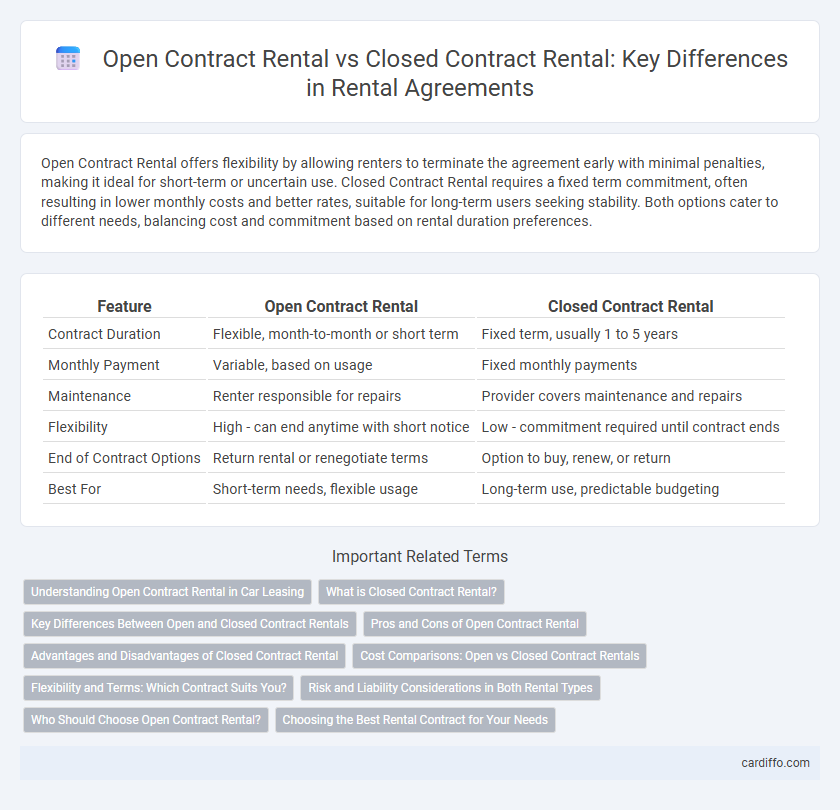Open Contract Rental offers flexibility by allowing renters to terminate the agreement early with minimal penalties, making it ideal for short-term or uncertain use. Closed Contract Rental requires a fixed term commitment, often resulting in lower monthly costs and better rates, suitable for long-term users seeking stability. Both options cater to different needs, balancing cost and commitment based on rental duration preferences.
Table of Comparison
| Feature | Open Contract Rental | Closed Contract Rental |
|---|---|---|
| Contract Duration | Flexible, month-to-month or short term | Fixed term, usually 1 to 5 years |
| Monthly Payment | Variable, based on usage | Fixed monthly payments |
| Maintenance | Renter responsible for repairs | Provider covers maintenance and repairs |
| Flexibility | High - can end anytime with short notice | Low - commitment required until contract ends |
| End of Contract Options | Return rental or renegotiate terms | Option to buy, renew, or return |
| Best For | Short-term needs, flexible usage | Long-term use, predictable budgeting |
Understanding Open Contract Rental in Car Leasing
Open Contract Rental in car leasing offers flexibility by allowing lessees to return the vehicle before the contract ends without heavy penalties, making it ideal for businesses with fluctuating transportation needs. This type of rental typically involves fixed monthly payments covering maintenance and insurance, emphasizing cost predictability. Understanding the terms, mileage limits, and return conditions is crucial for maximizing benefits and avoiding unexpected charges in Open Contract Rental agreements.
What is Closed Contract Rental?
Closed contract rental is a leasing arrangement where the renter pays a fixed monthly fee that covers depreciation, interest, and often maintenance, with no additional costs at the end of the contract. This type of rental provides budget certainty, as the final payment is predetermined regardless of mileage or wear and tear within agreed limits. Closed contract rental is popular for businesses seeking predictable expenses and hassle-free vehicle management over a set term.
Key Differences Between Open and Closed Contract Rentals
Open contract rentals allow renters to terminate the lease early without significant penalties, offering greater flexibility and month-to-month payment options. Closed contract rentals require a fixed-term commitment, often with lower monthly rates but penalties for early termination, providing cost predictability. The key differences lie in contract duration, flexibility, and financial obligations tied to early contract termination.
Pros and Cons of Open Contract Rental
Open Contract Rental offers flexibility by allowing renters to terminate the lease without penalty, making it ideal for short-term needs or uncertain plans. However, the monthly payments are generally higher compared to Closed Contract Rental, increasing overall costs. This option provides greater adaptability but may lack the financial predictability and lower rates found in fixed-term agreements.
Advantages and Disadvantages of Closed Contract Rental
Closed contract rental offers fixed monthly payments that include maintenance, insurance, and taxes, providing budget certainty and reduced financial risk. This type of rental eliminates unexpected costs, making it ideal for businesses seeking predictable expenses and simplified vehicle management. However, closed contract rental often involves less flexibility in contract duration and mileage limits, potentially leading to additional charges if conditions are exceeded.
Cost Comparisons: Open vs Closed Contract Rentals
Open contract rentals typically offer flexible return options but may incur higher overall costs due to mileage charges and potential wear-and-tear fees. Closed contract rentals provide a fixed rental price based on a predetermined mileage allowance, often resulting in better cost predictability and potentially lower expenses for short-term or limited-distance use. Comparing total cost of ownership, closed contracts generally benefit renters seeking budget certainty, while open contracts may suit travelers requiring flexibility despite higher variable costs.
Flexibility and Terms: Which Contract Suits You?
Open contract rental offers greater flexibility with mileage allowances and contract duration, allowing adjustments to suit changing needs, making it ideal for drivers with unpredictable usage patterns. Closed contract rental provides fixed terms and mileage limits, often resulting in lower monthly payments and predictable costs, best suited for those with stable driving habits. Selecting between the two depends on your desire for adaptable terms versus cost predictability and fixed conditions.
Risk and Liability Considerations in Both Rental Types
Open contract rentals expose renters to higher financial risk due to fluctuating costs like mileage overages and excessive wear charges, while liability typically remains the renter's responsibility for damages beyond normal use. Closed contract rentals provide more predictable expenses with fixed fees covering mileage and maintenance, reducing unexpected charges but often requiring the renter to accept stricter usage terms. Both rental types mandate renters to understand insurance provisions and potential liabilities for damages or third-party claims to manage overall risk effectively.
Who Should Choose Open Contract Rental?
Open Contract Rental is ideal for renters seeking flexibility in mileage and contract duration without the penalty of excess mileage fees, making it a preferred choice for those with unpredictable travel patterns. Businesses with fluctuating transport needs or individuals planning longer-term use benefit from the adaptable terms and cost control offered by open contracts. This rental type suits customers who prioritize adjustable agreements over fixed-mileage limits inherent in Closed Contract Rentals.
Choosing the Best Rental Contract for Your Needs
Open contract rental offers flexibility with variable mileage and maintenance costs, ideal for those with unpredictable usage patterns or short-term needs. Closed contract rental includes fixed monthly payments covering mileage limits and maintenance, providing budget certainty for long-term users with predictable driving habits. Assessing your driving frequency, budget preferences, and maintenance willingness helps determine whether an open or closed contract rental best suits your requirements.
Open Contract Rental vs Closed Contract Rental Infographic

 cardiffo.com
cardiffo.com